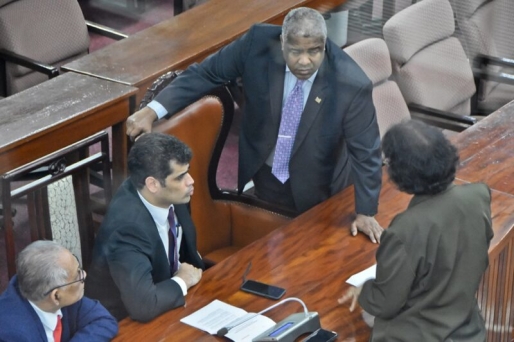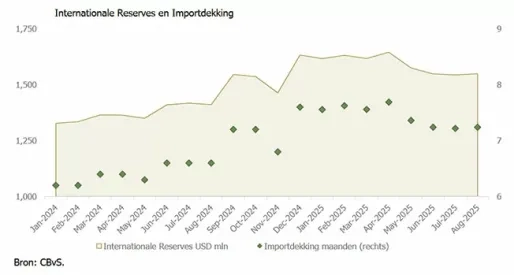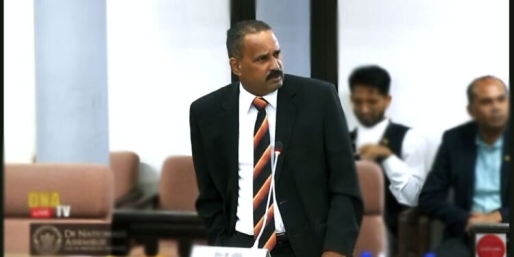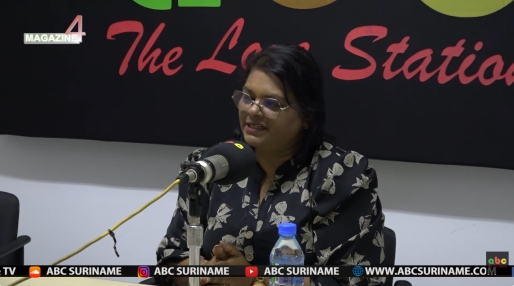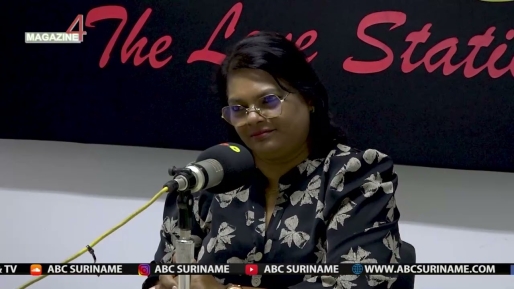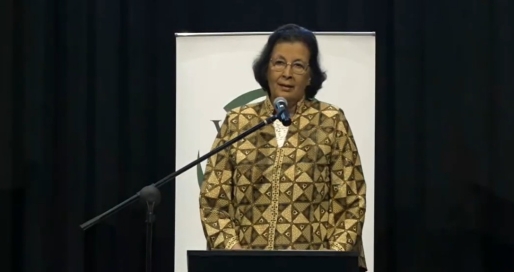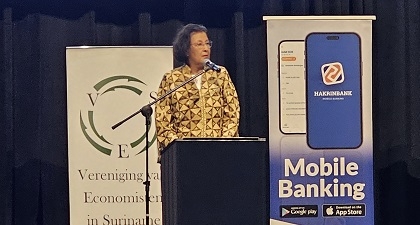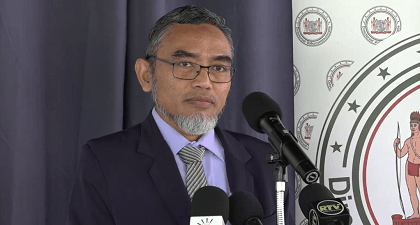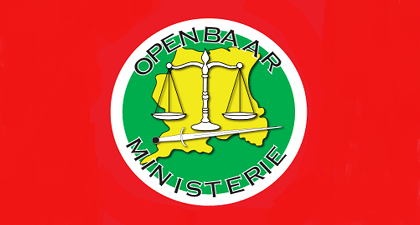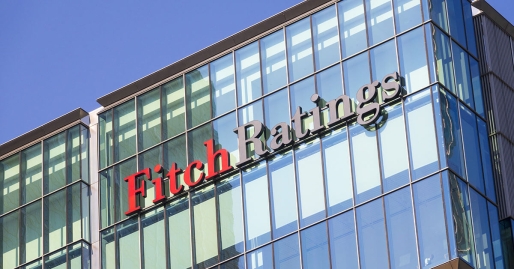
Fitch Downgrades Suriname's Long-Term Foreign Currency IDR to 'C'
| fitchratings.com | Door: Redactie
Fitch Ratings - New York - 26 Oct 2020: Fitch Ratings has downgraded Suriname's Long-Term Foreign-Currency (LT-FC) Issuer Default Rating (IDR) to 'C' from 'CC'
KEY RATING DRIVERS
The downgrade of Suriname's Long-Term Foreign-Currency (LT-FC) Issuer Default Rating (IDR) to 'C' from 'CC' reflects Fitch's view that a process of default has begun. On Oct.22 the Government of Suriname announced that it intends to enter a 30-day grace period on the USD25.4 million interest payment on its USD550 million 2026 notes due Oct. 26.
Further, Fitch judges that the Government of Suriname has begun a distressed debt exchange (DDE) process upon the authorities'
This is consistent with public statements by President Chandrikapersad Santokhi (Progressive Reform Party, VHP) and top ministers since the new administration was inaugurated July 16 as well as the VHP's party manifesto. Further, Suriname's national debt law imposes a statutory requirement on the minister of finance to present a debt
Fitch has downgraded the senior unsecured foreign currency ratings on Suriname's USD 2023 and 2026 notes to 'C' from 'CC'. The government previously restructured the 2023 bonds in July 2020.
Failure to deliver the 2026 interest payment during the grace period would put the sovereign into 'Restricted Default' (RD) and the specific bond into 'Default' (D). A foreign commercial debt restructuring that entails a material reduction in terms and is necessary to avoid a traditional payment default would constitute a DDE according to Fitch's Sovereign Rating Criteria resulting in the LT-FC IDR being downgraded to 'RD' and the affected instruments to 'D'.
Suriname's central government (CG) debt remains high (forecast at 137% of GDP by December 2020 excluding any agreement with creditors), and the government deficit is structurally wide. Shortages of foreign currency remain material for the economy, and a higher parallel SRD-USD rate relative to the official exchange rate persisted in October; however, a large devaluation on Sept. 22, which more than halved the value of the Suriname dollar relative to the US dollar, will partially alleviate external imbalances. The government's financing conditions are distressed amid curtailed multilateral and foreign market access. Three-quarters of the CG debt is denominated in foreign currency (including USD313 million foreign-currency domestic liabilities), rendering debt sustainability vulnerable to devaluation of the Suriname dollar.
The breadth of the Government of Suriname's restructuring plans has not yet been disclosed. The announcement "invites all holders of commercial obligations of the Republic, including the notes, to an investor presentation…" Central government debt totaled USD3,125 million as of July valued at end-September exchange rates. Of this, USD2,042 million (65%) was external debt, USD313 million (10%) was issued in foreign currency in the domestic market and the equivalent of USD770 million (25%) in Suriname dollars in the domestic market. External debt includes market debt of USD835 million (27% of the total), bilateral liabilities of USD556 million (18% of the total), of which China represents USD304 million (10% of the total), and multilateral liabilities of USD651 million (21% of the total).
The government announced that supplier arrears had reached SRD243 million by the end of August, which we estimate are less than 0.6% of GDP. Additional unpublished state-owned enterprise liabilities (excluding the state oil and gold company) are large, and the central government's exposure to them is substantial. The authorities plan an investor presentation Oct. 30.
Fitch has affirmed Suriname's Long-Term Local-Currency IDR at 'CCC'. We view that the restructuring risk of local currency debt as significant, but of lower risk than foreign currency debt. The central bank holds the majority (87%) of local currency debt, and both this as well as the domestic privately held local currency debt is automatically subject to expected considerable erosion of value from high inflation during 2020-2021.
ESG Considerations:
Suriname has an ESG Relevance Score (RS) of 5 for both Political Stability and Rights and for the Rule of Law, Institutional and Regulatory Quality and Control of Corruption, as is the case for all sovereigns. These scores reflect the high weight that the World Bank Governance Indicators (WBGI) have in Fitch's proprietary Sovereign Rating Model. Suriname has a medium WBGI ranking at the 43rd percentile, reflecting a recent track record of peaceful political transitions, a moderate level of rights for participation in the political process, moderate institutional capacity, established rule of law and a moderate level of corruption.
ESG - Creditor Rights: Suriname has an ESG Relevance Score (RS) of 5 for Creditor Rights as willingness to service and repay debt is highly relevant to the rating and is a key rating driver with a high weight. The government of Suriname restructured its USD 2023 notes during July 2020. In Fitch's view, a new process of default has begun.
RATING SENSITIVITIES
Factors that could, individually or collectively, lead to positive rating action/upgrade:
--Public Finances: Payment of pending interest payments within stipulated grace periods and a renouncement by the government of plans to restructure its debt.
Factors that could, individually or collectively, lead to negative rating action/downgrade:
--Public Finances: Failure to pay interest due to private sector creditors within the stipulated grace period.
--Public Finances: Completion of a debt restructuring (a distressed debt exchange).
--Public Finances: The rating for the LT Local Currency IDR would be downgraded to 'CC' if a default becomes probable and to 'C' if the government announces plans to restructure its Suriname dollar-denominated debt.
SOVEREIGN RATING MODEL (SRM) AND QUALITATIVE OVERLAY (QO)
In accordance with its rating criteria for ratings of 'CCC' and below, Fitch's sovereign rating committee has not utilized the SRM and QO to explain the ratings, which are instead guided by the ratings definitions.
Fitch's SRM is the agency's proprietary multiple regression rating model that employs 18 variables based on three-year centered averages, including one year of forecasts, to produce a score equivalent to a LT FC IDR. Fitch's QO is a forward-looking qualitative framework designed to allow for adjustment to the SRM output to assign the final rating, reflecting factors within our criteria that are not fully quantifiable and/or not fully reflected in the SRM.
BEST/WORST CASE RATING SCENARIO
International scale credit ratings of Sovereigns, Public Finance and Infrastructure issuers have a best-case rating upgrade scenario (defined as the 99th percentile of rating transitions, measured in a positive direction) of three notches over a three-year rating horizon; and a worst-case rating downgrade scenario (defined as the 99th percentile of rating transitions, measured in a negative direction) of three notches over three years. The complete span of best- and worst-case scenario credit ratings for all rating categories ranges from 'AAA' to 'D'. Best- and worst-case scenario credit ratings are based on historical performance. For more information about the methodology used to determine sector-specific best- and worst-case scenario credit ratings, visit [https://www.fitchratings.com/site/re/10111579].
KEY ASSUMPTIONS
--Fitch expects global indicators to move broadly in line with Fitch's Global Economic Outlook forecasts.
SUMMARY OF DATA ADJUSTMENTS
--Fitch analyzes government operations on a cash basis (which includes net payments of supplier arrears) using published Ministry of Finance statistics on arrears flows, which have been material in some historical periods. We adopt this conservative treatment because it better explains the scale of the government's financing needs and change in government debt/GDP during 2015-2019 than the narrower government commitment balance also published by the Ministry of Finance.
--Suriname's National Debt Law uses historical exchange rates to value government debt/GDP. Fitch values government debt/GDP at reference period-end market exchange rates. Fitch's conversion ensures that government debt/GDP is valued in line with market best practices, including during periods of exchange rate volatility.
REFERENCES FOR SUBSTANTIALLY MATERIAL SOURCE CITED AS KEY DRIVER OF RATING
The principal sources of information used in the analysis are described in the Applicable Criteria.
INFORMATION LIMITATIONS
--The stock of government arrears to suppliers is not regularly publicly disclosed. Fitch utilizes published data on the flow of arrears incurred and payments thereof to observe the direction of net arrears and attendant financing pressure.
--The national authorities do not publish regular financial soundness indicators, and limited bank capitalization represents a material contingent liability to the government. Fitch instead relies upon the financial soundness indicators released only periodically in the annual IMF Article IV reports. The weaknesses in Suriname's financial system are reflected in the current rating level.
ESG CONSIDERATIONS
Suriname has an ESG Relevance Score of '5' for Political Stability and Rights as World Bank Governance Indicators have the highest weight in Fitch's SRM and are highly relevant to the rating and a key rating driver with a high weight.
Suriname has an ESG Relevance Score of '5' for Rule of Law, Institutional & Regulatory Quality and Control of Corruption as WBGI have the highest weight in Fitch's SRM and are therefore highly relevant to the rating and are a key rating driver with a high weight.
Suriname has an ESG Relevance Score of '5' for Creditor Rights as willingness to service and repay debt is highly relevant to the rating and is a key rating driver with a high weight.
Suriname has an ESG Relevance Score of '4' for Human Rights and Political Freedoms as the Voice and Accountability pillar of the WBGI are relevant to the rating and a rating driver.
Except for the matters discussed above, the highest level of ESG credit relevance, if present, is a score of '3'. This means ESG issues are credit-neutral or have only a minimal credit impact on the entity, either due to their nature or to the way in which they are being managed by the entity. For more information on Fitch's ESG Relevance Scores, visit www.fitchratings.com/esg.
| ENTITY/DEBT | RATING | PRIOR | |||
|---|---|---|---|---|---|
| Suriname | LT IDR | C | Downgrade | CC | |
| ST IDR | C | Affirmed | C | ||
| LC LT IDR | CCC | Affirmed | CCC | ||
| LC ST IDR | C | Affirmed | C | ||
| Country Ceiling | CCC | Affirmed | CCC | ||
| LT | C | Downgrade | CC | |
VIEW ADDITIONAL RATING DETAILS
Additional information is available on www.fitchratings.com
The following issuer(s) did not participate in the rating process, or provide additional information, beyond the issuer's available public disclosure: Suriname
APPLICABLE CRITERIA
- Sovereign Rating Criteria - Effective from 27 April 2020 to 26 October 2020 (pub. 27 Apr 2020)(including rating assumption sensitivity)
- Country Ceilings Criteria (pub. 01 Jul 2020)
APPLICABLE MODELS
Numbers in parentheses accompanying applicable model(s) contain hyperlinks to criteria providing description of model(s).
- Country Ceiling Model, v1.7.1 (1)
- Macro-Prudential Indicator Model, v1.5.0 (1)
- Sovereign Rating Model, v3.12.1 (1)
ADDITIONAL DISCLOSURES
ENDORSEMENT STATUS
| Suriname | EU Endorsed |
ADDITIONAL DISCLOSURES FOR UNSOLICITED CREDIT RATINGS
Suriname (Unsolicited)
|
DISCLAIMER
ALL FITCH CREDIT RATINGS ARE SUBJECT TO CERTAIN LIMITATIONS AND DISCLAIMERS. PLEASE READ THESE LIMITATIONS AND DISCLAIMERS BY FOLLOWING THIS LINK: HTTPS://WWW.FITCHRATINGS.COM/UNDERSTANDINGCREDITRATINGS. IN ADDITION, THE FOLLOWING
READ MORE
COPYRIGHT
Copyright © 2020 by Fitch Ratings, Inc., Fitch Ratings Ltd. and its subsidiaries. 33 Whitehall Street, NY, NY 10004. Telephone: 1-800-753-4824, (212) 908-0500. Fax: (212) 480-4435. Reproduction or retransmission in whole or in part is prohibited except by permission. All rights reserved. In issuing and maintaining its ratings and in making other report
READ MORE
SOLICITATION STATUS
The ratings above were solicited and assigned or maintained at the request of the rated entity/issuer or a related third party. Any exceptions follow below.
| ENTITY/SECURITY | ISIN/CUSIP/COUPON RATE | RATING TYPE | SOLICITATION STATUS |
|---|---|---|---|
| Suriname USD 125 mln 9.88% bond/note 30-Dec-2023 | US86886PAB85 | Long Term Rating | Unsolicited |
| Suriname | - | Local Currency Long Term Issuer Default Rating | Unsolicited |
| Suriname | - | Country Ceiling | Unsolicited |
| Suriname USD 550 mln 9.25% bond/note 26-Oct-2026 | USP68788AA97 | Long Term Rating | Unsolicited |
| Suriname | - | Long Term Issuer Default Rating | Unsolicited |
| Suriname | - | Short Term Issuer Default Rating | Unsolicited |
| Suriname USD 550 mln 9.25% bond/note 26-Oct-2026 | US86886PAA03 | Long Term Rating | Unsolicited |
| Suriname | - | Local Currency Short Term Issuer Default Rating | Unsolicited |
ENDORSEMENT POLICY
Fitch's approach to ratings endorsement so that ratings produced outside the EU may be used by regulated entities within the EU for regulatory purposes, pursuant to the terms of the EU Regulation with respect to credit rating agencies, can be found on the EU Regulatory Disclosures page. The endorsement status of all International ratings is provided within the entity summary page for each rated entity and in the transaction detail pages for all structured finance transactions on the Fitch website. These disclosures are updated on a daily basis.
| fitchratings.com | Door: Redactie











